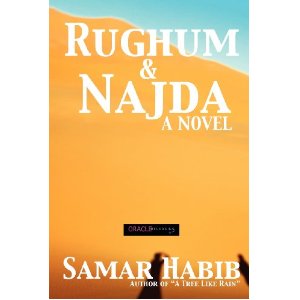Rughum & Najda by Samar Habib is a fictional love story set in ninth-century Baghdad. Rughum, a Muslim woman, meets Najda, a witch who was raised with a Manichean family. Rughum and Najda’s love story is the main story around the stories of several lesbian (or “tharifa”) women in the book. Besides Rughum and Najda, we have Bathal, who because a woman of high rank and property when one of her male admirers bought her freedom; Qureisha, who lives with Bathal; and many others.
According to a press release from the book’s publisher, Habib wrote the book in part because of a lack of other fiction writing on the topic; in her words, “There has not been to date, a ficto-historical novel dealing with same-sex love among women set during the golden age of Islam.” Her engagement with the topic is based on her own background as a historian, specialising in “Arab history and civilizations” and “lives of homosexual women in the Middle Ages and antiquity.”
I don’t want to give too many spoilers; the book follows the twists and turns and ups and downs of Rughum and Najda’s relationships, both with each other and with other women, through exile, court cases, disguises and death threats. Being a known lesbian is a dangerous thing in this story. Rughum’s inabililty to consummate her marriage with her elderly husband costs her the security of family. Najda, bearing the double burden of being a tharifa and not being of the People of the Book, constantly has to watch her back and is never safe anywhere. Bathal too, despite having a certain status and wealth in society, has her life threatened by a judge.
These are all women whose sexuality came very close to costing them their lives. I couldn’t help feeling an impending sense of danger as I turned the pages – these women are not safe. I can’t imagine living in that kind of stress and pain and societal pressure to conform. I know that for some women, the case remains the same today. This book does a very good job at describing the feelings of these women regarding their sexuality and how they have to learn to navigate their world without having close relationships with men. Because men become husbands and protectors and mahrams. Because sleeping with men makes you “normal.” Because when men “fall in love” you are supposed to reciprocate.
So for me there are two takeaways: it is dangerous to be a lesbian and it is dangerous not to sleep with men. Sex is power, even back then, and when you take yourself out of the game with men, you put yourself in danger as a woman.
I have one small criticism of the book, which may be due more to my ignorance than anything else: it’s not blatantly obvious, especially in the first few pages, what time period we are in and where exactly the book’s events take place. So I was sucked into a kind of Thousand and One Nights time warp until I did some googling. So if you aren’t up on your history it might take some time to get into Rughum & Najda, but once you do it is a fast, captivating read. I read the book in only two or three sittings without getting bored or flipping pages. I really enjoyed Habib’s engaging writing style and the insight she gave me into a world I don’t know.
Finally, I don’t want this review to become the starting point of yet another discussion of whether or not homosexuality is permitted in Islam or ZOMG MMW is trying to “normalize” homosexuality AGAIN. As far as the permissibility of homosexuality in Islam goes, I think we need to stop with the “is it halal” discussions for everything (headscarves another good example), and understand that there is a spectrum in Muslim experience and practice. Instead of wasting time and energy endlessly debating permissibility, let’s leave that to scholars and accept that human beings have free will and usually make the decisions they feel are right based on their unique sets of personal circumstances. As far as “normalization” goes, I think it is intellectually irresponsible and borderline dangerous to pretend that homosexuality is not part of our history. The stories of LGBT Muslims are not often told. Rughum & Najda thus fills a gap in the telling of our stories.
Rughum & Najda is published by Oracle Releasing and is available at Amazon and Barnes and Noble.


